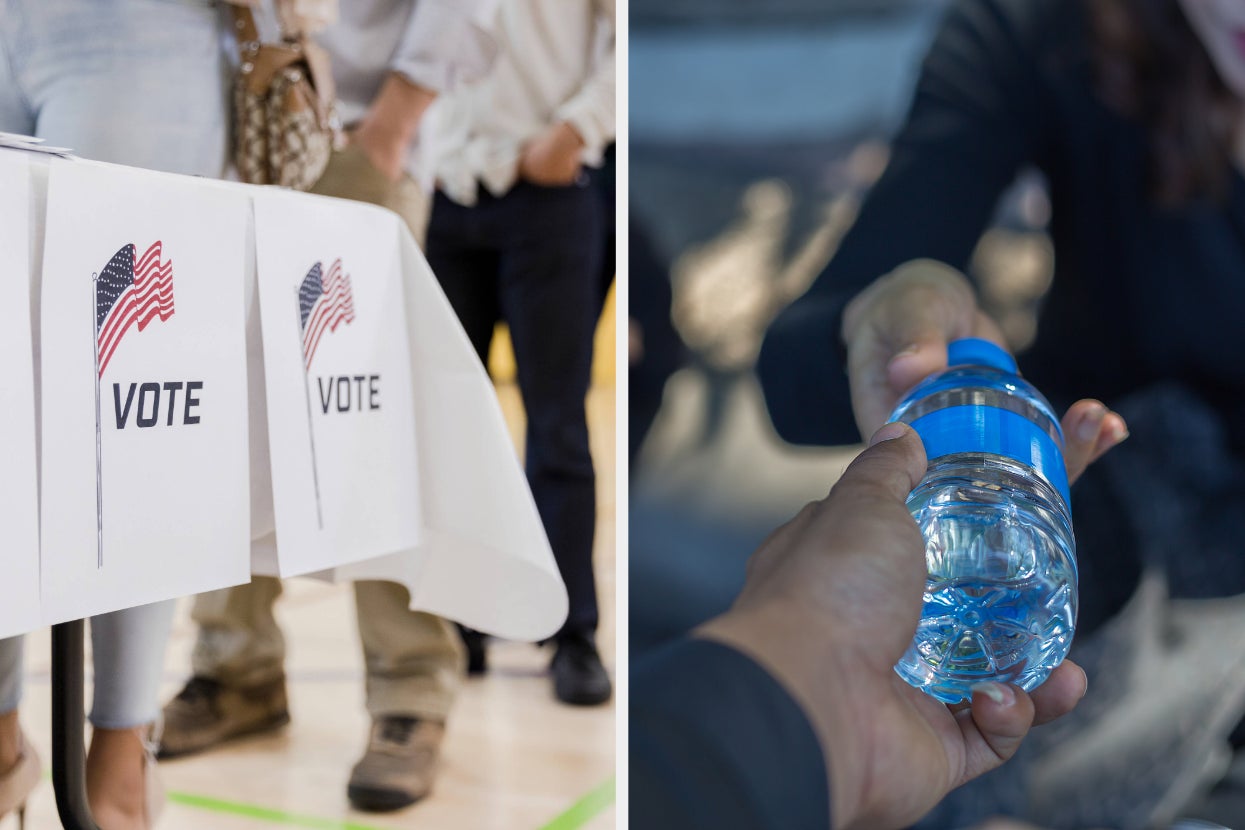
If you’re wondering why handing out snacks or drinks in a voting line would ever be considered an issue, Caren Short, director of legal and research for the League of Women Voters, a nonpartisan organization focused on voter registration, points to a concept known as “electioneering.”
Electioneering refers to a political candidate’s campaign or a political party taking actions to convince voters to support their candidate or party. When it comes to polling locations, every state has laws in place that restrict the ability of political operatives to interact with or influence voters. “The idea is when voters go to vote, they need to have the sanctuary and they need to not have any undue influence on them politically so that they can go and vote and not have any one political party or candidate influencing their votes,” Short explained.
States get to set their own electioneering limits; according to Short, the allowed distance between a political group engaging in electioneering and a polling location “is usually a 150-foot line.” However, “It’s different in every state. Sometimes it’s 100 feet; sometimes it’s 300 feet,” she said.
To check your own state’s electioneering laws, you can refer to this handy guide from the National Conference of State Legislatures.
Some states have specific laws against ‘line warming.’
So what does electioneering have to do with a scenario like Larry getting arrested for giving a water bottle to a voter in Georgia? Short told us that the connection between Georgia’s anti-food and anti-drink provision, Senate Bill 202, and electioneering is pretty flimsy.
“What Georgia was arguing is that if someone from a political party (like someone wearing a ‘Vote for This Person’ T-shirt) hands you a bottle of water, that could be considered electioneering,” Short said. But that argument falls apart because, as Short explained, “we had nonpartisan groups handing people water [in 2020] because they were standing in line for eight hours. So that argument was that this is just neighbors helping neighbors, like what Larry David [did in the episode]. They’re not wearing any campaign paraphernalia.”
Which brings us to the notion of “line warming,” which the American Bar Association defines as “an informal term for practices like providing items with minimal value, such as a water bottle or snacks, to people waiting in line to vote.” Line warming, unlike electioneering, doesn’t necessarily involve partisan groups or political campaigns. Anyone providing a snack or drink to someone in a voting line can be subject to line warming restrictions in states with these provisions on the books.
The SB 202 provision in Georgia is an example of legislation that outlaws line warming of any kind. “SB 202 gave criminal penalties to anyone who handed out food and water to voters who are in line,” Short told us. She went on to emphasize that this provision effectively served as a form of voter suppression in Georgia.
“In Georgia, we have so many hurdles for voting like other voter suppression laws, anti-voter laws that are on the books, [rules that] make it harder to register, to vote, to get an absentee ballot, and to have your vote counted,” she said. “We have really long lines in a lot of areas of Georgia, especially in Black and brown communities. The problem is that there are long lines in the first place, and so people are standing out in these lines for literal hours.”
Short sees these long lines as the result of policies designed to discourage voting and to make the process as difficult as possible. “We have state legislatures passing bill after bill that is making voting harder and more burdensome legislative session after legislative session, and we keep hearing about ‘voter fraud.’ What we’re not seeing is voter fraud. What we are seeing is voter suppression and state legislatures using the myth of voter fraud to justify laws that are causing scores and scores of voters to be disenfranchised through long lines,” she explained.
The lines are longer than they should be, voters get hungry and thirsty while waiting for hours, and people who try to help by passing along a bottle of water can face criminal penalties.
The good news? Some states with anti-line warming laws have seen those rules struck down by the courts, including Georgia. In August 2023, a federal court in the Northern District of Georgia blocked the portions of SB 202 that banned food and drink distribution in voting lines. A similar law that’s long been on the books in New York was blocked by a federal court in June 2024.
Unfortunately, other states haven’t had the same level of luck in getting these restrictions removed. In 2023, a Florida appeals court allowed the passage of a sweeping (and highly controversial) election reform law with a provision that bans line warming (including handing out food and drink). Arkansas passed a law in 2021 that banned food and drink distribution within 100 feet of a polling location. Although a lawsuit challenging the Arkansas law was successful in the lower courts, the Arkansas Supreme Court reversed this ruling in 2024, which means that the ban remains in place.
